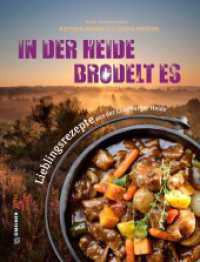- ホーム
- > 洋書
- > 英文書
- > Religion / Ethics
Full Description
This substantially revised second edition of The Routledge Handbook of Research Methods in the Study of Religion remains the only comprehensive survey in English of methods and methodology in the discipline. Designed for non-specialists and upper undergraduate-/graduate-level students, it discusses the range of methods currently available to stimulate interest in unfamiliar methods and enable students and scholars to evaluate methodological issues in research.
The Handbook comprises 39 chapters - 21 of which are new, and the rest revised for this edition. A total of 56 contributors from 10 countries cover a broad range of topics divided into three clear parts:
Methodology
Methods
Techniques
The first section addresses general methodological issues: including comparison, research design, research ethics, intersectionality, and theorizing/analysis. The second addresses specific methods: including advanced computational methods, autoethnography, computational text analysis, digital ethnography, discourse analysis, experiments, field research, grounded theory, interviewing, reading images, surveys, and videography. The final section addresses specific techniques: including coding, focus groups, photo elicitation, and survey experiments.
Each chapter covers practical issues and challenges, theoretical bases, and their use in the study of religion/s, illustrated by case studies.
The Routledge Handbook of Research Methods in the Study of Religion is essential reading for students and researchers in the study of religion/s, as well as for those in related disciplines.
Contents
Part 1: Methodology 1.1. Introduction: methods, methodology and method in the study of religion/s Steven Engler and Michael Stausberg 1.2. Comparison Michael Stausberg 1.3. Designing research Ann Taves and Raymond F. Paloutzian 1.4. Feminist methodologies and feminist standpoint analysis Mary Jo Neitz 1.5. Intersectionality Anjana Narayan, Bandana Purkayastha and Koyel Khan 1.6. Research ethics Sophie Gilliat-Ray, Stephen Jacobs, Stephen E. Gregg, Frederick Bird, Laurie Lamoureux Scholes and Steven Engler 1.7. Theorizing and analysis Steven Engler and Mark Q. Gardiner Part 2: Methods 2.1. Advanced computational methods Wesley J. Wildman, Saikou Y. Diallo and F. LeRon Shults 2.2. Autoethnography Irene Zempi and Imran Awan 2.3. Computational text analysis Frederik Elwert 2.4. Content analysis Diane M. Badzinski, Robert H. Woods Jr. and Chad M. Nelson 2.5. Conversation analysis Esa Lehtinen 2.6. Diary studies Andy Alaszewski 2.7. Digital ethnography Anna Neumaier 2.8. Discourse analysis Titus Hjelm 2.9. Document analysis Grace Davie and David Wyatt 2.10. Experimental methods Justin L. Barrett 2.11. Field research and participant observation Graham Harvey 2.12. Grounded theory Steven Engler 2.13. Hermeneutics Ingvild Sælid Gilhus 2.14. History Jörg Rüpke 2.15. Interview methods Tanya M. Luhrmann 2.16. Microhistory Sigurður Gylfi Magnússon 2.17. Network analysis Alexander-Kenneth Nagel 2.18. Phenomenology Kalpana Ram 2.19. Philology Einar Thomassen 2.20. Reading images Jeanette Favrot Peterson 2.21. Semiotics Robert A. Yelle 2.22. Sequence analysis Volkhard Krech and Martin Radermacher 2.23. Surveys and questionnaires Michael Stausberg 2.24. Translation Alan Williams 2.25. Videography Hubert Knoblauch and Meike Haken Part 3: Techniques 3.1. Coding Steven Engler, Andy Alaszewski, Tanya M. Luhrmann and Emily Winter 3.2. Event model analysis Egil Asprem and Ann Taves 3.3. Focus groups Emily Winter and Linda Woodhead 3.4. Free-listing Michael Stausberg 3.5. Photo elicitation Sarah L.B. Dunlop 3.6. Semantic differential Ralph W. Hood, Heinz Streib, Barbara Keller 3.7. Survey experiments Landon Schnabel 3.8. Survey item validation Melissa Gordon Wolf, Elliott Ihm, Andrew Maul and Ann Taves Index








